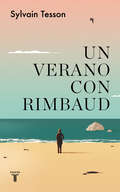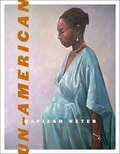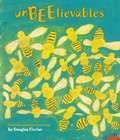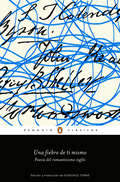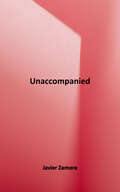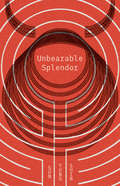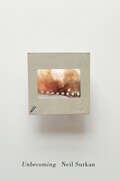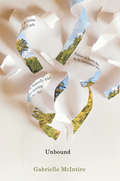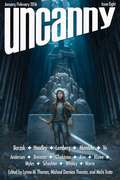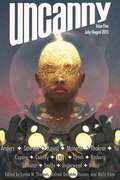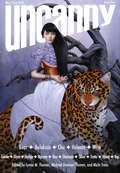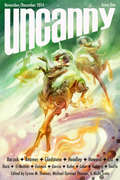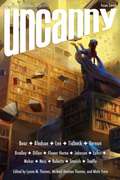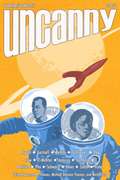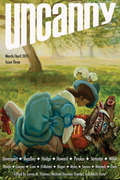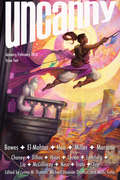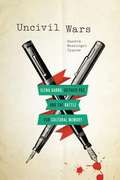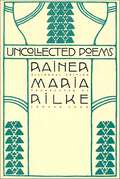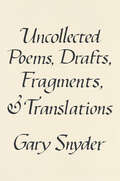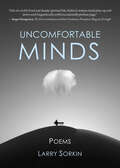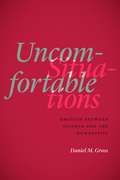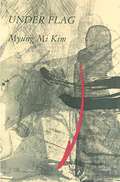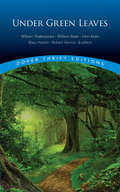- Table View
- List View
Un verano con Rimbaud
by Sylvain TessonSylvain Tesson nos receta los versos de Rimbaud y el caminar como antídotos esenciales contra el tedio.El viaje con el que arranca este maravilloso libro evoca la primera de tantas fugas de Arthur Rimbaud, en 1870, huyendo de su madre. Para el autor de Iluminaciones y Una temporada en el infierno, la vida se organiza en movimiento, el estado supremo de la poesía. Sylvain Tesson, que comparte con él la naturaleza inquieta del caminante, sigue los pasos del enfant terrible desde sus primeros versos en latín hasta las ansias de aventura que lo condujeron a Abisinia. Rimbaud se movió sin descanso, cambiando constantemente de puntode vista. Escapó de las Ardenas, pasó por salones parisinos de los que no quiso formar parte, persiguió el amor en Bélgica, vagó por Londres y se aventuró a morir en las pistas de tierra africanas. Un verano con Rimbaud recorre paisajes reales e imaginarios y se adentra en expresiones y versos del poeta como su conocido «yo es otro», que permite reflexionar sobre la escisión del sujeto moderno, o su famoso poema de las vocales. Tesson comprende como nadie sunecesidad de desplazarse, propone una interpretación sutil y elegante de sus versos y aviva en el lector el deseo de conocer o reencontrarse con una obra escasa pero salvaje. La crítica ha dicho:«Uno conquistó Europa y luego África; el otro atravesó Islandia, las estepas de Asia o incluso el Himalaya. Rimbaud y Tesson comparten la pasión por viajar y escribir».Radio Notre Dame «A contracorriente, con el brío que le caracteriza, el escritor viajero lanza aquí un alegato a favor de la poesía y contra el espíritu de nuestro tiempo. Combate los efectos perversos de la rimbauditis (enfermedad de la sociedad del espectáculo) y nos propone un ejercicio que, en su opinión, se ha vuelto poco común en nuestros días: leer la obra de Rimbaud».Le Devoir «Este libro propone a los lectores una experiencia total de Arthur Rimbaud, un poeta aquejado de dromomanía: el impulso patológico del desplazamiento, una enfermedad de la que Sylvain Tesson también parece presentar todos los síntomas».Radio Classique «Una voz única. Tesson es un escritor tremendamente interesante».Libération
Un-American (Wesleyan Poetry Series)
by Hafizah Augustus Geter2021 PEN Open Book Finalist 2021 NAACP Image Award Finalist, Poetry2021 Brooklyn Public Library Literary Prize, LonglistDancing between lyric and narrative, Hafizah Geter's debut collection moves readers through the fraught internal and external landscapes—linguistic, cultural, racial, familial—of those whose lives are shaped and transformed by immigration. The daughter of a Nigerian Muslim woman and a former Southern Baptist black man, Geter charts the history of a black family of mixed citizenships through poems imbued by migration, racism, queerness, loss, and the heartbreak of trying to feel at home in a country that does not recognize you. Through her mother's death and her father's illnesses, Geter weaves the natural world into the discourse of grief, human interactions, and socio-political discord. This collection thrums with authenticity and heart.SAMPLE POEMTestimony for Tamir Rice, 2002-2014Mr. President, After they shot me they tackled my sister.The sound of her knees hitting the sidewalk made my stomach ache. It was a bad pain. Like when you love someone and they lie to you. Or that time Mikaela cried all through science class and wouldn't tell anyone why. This isn't even my first letter to you,in the first one I told you about my room and my favorite basketball team and asked you to come visit me in Clevelandor send your autograph. In the second one I thanked you for your responsible citizenship. I hope you are proud of me too.Mom said you made being black beautiful againbut that was before someone killed Trayvon. After that came a sadness so big it made everyonelook the same. It was a long time before we couldgo outside again. Mr. President it took one whole dayfor me to die and even though I'm twelve and not afraid of the darkI didn't know there could be so much of itor so many other boys here.
UnBEElievables: Honeybee Poems and Paintings
by Douglas FlorianThis book is a collection of poems and fabulous paintings describing the anatomy, the habits and the life of bees.
Una fiebre de ti mismo. Poesía del romanticismo inglés
by Varios AutoresUna antología que reúne los grandes nombres del romanticismo inglés. «El soplo de la más humilde de las flores puede ofrecer pensamientos que a menudo encuentro demasiado profundos para desgarrarlos.» Wordsworth, Coleridge, Lord Byron, Shelley y Keats constituyen una secuencia que bajo el nombre de poesía romántica inglesa puede citarse al lado del teatro griego o de la novela rusa como una de las cimas indiscutibles del espíritu humano, y del que ningún lector inquieto debería privarse. Escritos en la encrucijada de un absolutismo que se resiste a desvanecerse y una revolución liberal que no termina de cuajar, y con un ánimo incapaz de confiar en promesas divinas pero que no puede dejar de ver un halo de trascendencia en la naturaleza, estos poemas son ejemplos de tensión humana y de indagación expresiva. Las sensuales meditaciones de Wordsworth sobre la caducidad y el tiempo, los paisajes helados y mágicos de Coleridge, la altivez revolucionaria -en la política y en el corazón- de Byron, las prodigiosas y exquisitas odas de Keats y los desvíos visionarios de Shelley, de quien recogemos por primera vez en castellano su obra maestra, El triunfo de la vida, concurren en las luminosas páginas de un libro que sirve en nuevas traducciones de Gonzalo Torné un conjunto de poemas sin los que la humanidad no sería la misma.
Una voz dulce resonó en mi oído
by Rosalía de CastroPoesía Portátil suma a su colección la gran autora de las letras gallegas y precursora de la poesía española moderna: Rosalía de Castro. Rosalía de Castro es, sin duda, una de las voces poéticas más importantes de la lírica española del Romanticismo del siglo XIX. Gran precursora de la modernidad poética, la autora sigue siendo, incluso hoy en día, la viva imagen del espíritu y el alma máter literaria de su Galicia natal. Trabajó por defender las letras gallegas, devolviéndoles la dignidad y el carácter culto de una lengua literaria, y denunció la pobreza rural y la precariedad de su pueblo. Figura clave del rexurdimiento gallego, escribió tanto en su lengua materna –el gallego– como en castellano. Sus versos, cargados de pesimismo pero con una sensibilidad sublime, han inspirado a otros grandes autores como Antonio Machado, Luisa Carnés o Juan Ramón Jiménez. Dicen que antes de morir pidió ver el mar y la crítica apunta que esa era la imagen que tenía Rosalía de Castro de la muerte en sus poemas: la inmensidad del mar en la que descansar. El escritor y traductor Mauro Armiño, Premio Nacional a la Mejor Traducción (1979) por trasladar al castellano la poesía en gallego de Rosalía de Castro, se ha encargado de la antología de esta edición.«No cuidaré ya los rosalesni los palomos que suyos tengo;que sequen, como yo me seco,que mueran, como yo me muero.»
Unaccompanied
by Javier ZamoraNew York Times Bestselling Author of Solito "Every line resonates with a wind that crosses oceans."--Jamaal May "Zamora's work is real life turned into myth and myth made real life." –Glappitnova Javier Zamora was nine years old when he traveled unaccompanied 4,000 miles, across multiple borders, from El Salvador to the United States to be reunited with his parents. This dramatic and hope-filled poetry debut humanizes the highly charged and polarizing rhetoric of border-crossing; assesses borderland politics, race, and immigration on a profoundly personal level; and simultaneously remembers and imagines a birth country that's been left behind. Through an unflinching gaze, plainspoken diction, and a combination of Spanish and English, Unaccompanied crosses rugged terrain where families are lost and reunited, coyotes lead migrants astray, and "the thin white man let us drink from a hose / while pointing his shotgun." From "Let Me Try Again": He knew we weren't Mexican. He must've remembered his family coming over the border, or the border coming over them, because he drove us to the border and told us next time, rest at least five days, doesn't trust anyone calling themselves coyotes, bring more tortillas, sardines, Alhambra. He knew we would try again. And again--like everyone does. Javier Zamora was born in El Salvador and immigrated to the United States at the age of nine. He earned a BA at UC Berkeley, an MFA at New York University, and is a 2016-2018 Wallace Stegner Fellow at Stanford University.
Unattainable Earth
by Robert Hass Czeslaw MiloszMilosz writes poems about the inadequacy and despondency of modern life interjected with hope for the future.
Unbearable Splendor
by Sun Yung Shin"To graph the immigrant, the exile and 'pseudo-exile,' as 'a kind of star.' To perform childhood. 'Descent upon descent.' To write on '[p]aper soaked in milk.' Unbearable Splendor is a book like this, that is this: the opposite or near-far of home. What is the difference between a guest and a ghost? What will you feed them in turn? I was profoundly moved by the questions and deep bits of feeling in this gorgeous, sensing work, and am honored to write in support of its extraordinary and brilliant writer, Sun Yung Shin."-Bhanu Kapil"In Unbearable Splendor, Sun Yung Shin sticks a pin directly into the heart of who we are to reveal that a person is a mystery without beginning or end, borders or documents, complicated by robotics and astrophysics, arrivals and departures, myth and rewriting. A person is divided into multiple, complicated selves, as various and complex as the forms and approaches she employs in these poetic essays. To read Shin's work is to marvel at a rosebud's concealed and silent core and to slowly witness its elegant blooming. It is a delicate and majestic show."-Jenny Boully"Unbearable Splendor is a dazzling collage of biophysical metamorphoses, wherein the 'I' atomizes into multiple and self-replicating new mythologies of what constitutes an authentic being. 'I didn't know I wasn't human. My past was invented, implanted, and accepted. I'm more real than you are because I know I'm not real.' In our vast expanse, where 'every species is transitional,' Shin's lyricism, erudition, and tonal command of loss and indignation harmonize into a singular nucleus that hums and pulsates through each of these wondrous poetic meditations."-Ed Bok Lee
Unbecoming (Hugh MacLennan Poetry Series #65)
by Neil SurkanSubtler, subtler, beat our hearts / down aisles of cluttered glitz.Unbecoming, Neil Surkan's sophomore collection, clings to hope while the world deteriorates, transforms, and grows less hospitable from moment to moment. Interplaying tenderness with dogged perseverance, these poems tumble through vignettes of degraded landscapes, ebbing spiritual communities, faltering men, and precarious friendships.Yet, in the face of such despair, responsibility and optimism bolster one another – exuberance, amazement, and compassion persist despite the worsening of the wounded Earth. Multifaceted and inventive, this collection of poems vaults from intimation to excoriation, where grief, desire, bewilderment, and protest all crackle and meld. As the world "appears, exceeds, and un- / becomes too quickly for certainty, / just enough for love," the poems in Unbecoming face the horizon with wary eyes and refuse to turn away.
Unbound (Hugh MacLennan Poetry Series #59)
by Gabrielle McIntireinside sadness is glory / if you see it right way round, / find the seam, reverse it to perspectivize, / unwind light, joy's unravelling spoolInspired by mystical traditions, birdwatching, tree planting, ethics, neuropsychology, and quantum physics, Gabrielle McIntire's poems draw us in with their passionate attention to what it means to be human in a still-wondrous natural environment.Touching on human frailty, the eternal, and the ecological with a delicate and evocative brush, Unbound enacts an almost prayerful attentiveness to the earth's creatures and landscapes while it offers both mournful and humorous treatments of love and loss. McIntire's finely tuned musical voice – with its incantatory rhythms, rhymes, sound play, and entrancing double meanings – invites us to be courageously open to the unexpected.Unbound stirs us to re-evaluate our place amidst the astonishing beauty and wisdom of an Earth facing the early stages of climate change.
Uncanny Magazine Issue Eight
by Uncanny MagazineFeaturing all–new short fiction by Maria Dahvana Headley, Nghi Vo, Christopher Barzak, Brit Mandelo, and Rose Lemberg, classic fiction by Sarah Rees Brennan, nonfiction by Chris Kluwe, Max Gladstone, Isabel Schechter and L.M. Myles, poems by Kayla Whaley, Leslie J. Anderson, and Bryan Thao Worra, interviews with Maria Dahvana Headley and Christopher Barzak, and Priscilla H. Kim’s “Round Three” on the cover.
Uncanny Magazine Issue Five
by Uncanny MagazineFeaturing all–new short fiction by Mary Robinette Kowal, E. Lily Yu, Shveta Thakrar, Charlie Jane Anders, Sarah Monette, and Delilah S. Dawson, classic fiction by Scott Lynch, nonfiction by Natalie Luhrs, Sofia Samatar, Michael R. Underwood, and Caitlín Rosberg, poems by C. S. E. Cooney, Bryan Thao Worra, and Sonya Taaffe, interviews with E. Lily Yu and Delilah S. Dawson, and Antonio Caparo’s Companion Devices on the cover.
Uncanny Magazine Issue Four
by Uncanny MagazineFeaturing all–new short fiction by Catherynne M. Valente, A.C. Wise, John Chu, Elizabeth Bear, Lisa Bolekaja, classic fiction by Delia Sherman, nonfiction by Mike Glyer, Julia Rios, Kameron Hurley, Christopher J Garcia, and Steven H Silver, poems by Alyssa Wong, Ali Trotta, and Isabel Yap, interviews with John Chu and Delia Sherman, and Tran Nguyen’s Traveling to a Distant Day on the cover.
Uncanny Magazine Issue One
by Uncanny MagazineFeaturing new fiction by Maria Dahvana Headley, Kat Howard, Max Gladstone, Amelia Beamer, Ken Liu, and Christopher Barzak, classic fiction by Jay Lake, essays by Sarah Kuhn, Tansy Rayner Roberts, Christopher J Garcia, plus a Worldcon Roundtable featuring Emma England, Michael Lee, Helen Montgomery, Steven H Silver, and Pablo Vazquez, poetry by Neil Gaiman, Amal El-Mohtar, and Sonya Taaffe, interviews with Maria Dahvana Headley, Deborah Stanish, Beth Meacham on Jay Lake, and Christopher Barzak, and a cover by Galen Dara.
Uncanny Magazine Issue Seven
by Uncanny MagazineFeaturing all–new short fiction by Ursula Vernon, Elizabeth Bear, Karin Tidbeck, Yoon Ha Lee, and Alex Bledsoe, classic fiction by Alaya Dawn Johnson, nonfiction by Annalee Flower Horne and Natalie Luhrs, Aidan Moher, Tansy Rayner Roberts, and Deborah Stanish, poems by Mari Ness, Sonya Taaffe, and Lisa M. Bradley, interviews with Yoon Ha Lee and Alex Bledsoe, and Julie Dillon’s The Archivist on the cover.
Uncanny Magazine Issue Six
by Uncanny MagazineFeaturing all–new short fiction by Paul Cornell, Isabel Yap, Liz Argall, Kenneth Schneyer, and Keffy R. M. Kehrli, classic fiction by N.K. Jemisin, nonfiction by Diana M. Pho, Steven H Silver, Michi Trota, and David J. Schwartz, poems by Rose Lemberg, Dominik Parisien, Amal El–Mohtar, and Jennifer Crow, interviews with Isabel Yap, and Liz Argall and Kenneth Schneyer, and Matthew Dow Smith’s The Future Matters on the cover.
Uncanny Magazine Issue Three
by Uncanny MagazineFeaturing all-new short fiction by Sofia Samatar, Rosamund Hodge, Kat Howard, Maria Dahvana Headley, Sarah Pinsker, Emily Devenport, and Fran Wilde, classic fiction by Ellen Klages, nonfiction by Ytasha L. Womack, Stephanie Zvan, Amal El–Mohtar, and L.M. Myles, poems by C.S.E. Cooney, Jennifer Crow, and M Sereno, interviews with Sofia Samatar, C.S.E. Cooney, and Ellen Klages, and Carrie Ann Baade’s Unspeakable #2 on the cover.
Uncanny Magazine Issue Two
by Uncanny MagazineFeaturing new fiction by Hao Jingfang (translated by Ken Liu), Sam J. Miller, Amal El-Mohtar, Richard Bowes, and Sunny Moraine, classic fiction by Ann Leckie, essays by Jim C. Hines, Erica McGillivray, Michi Trota, and Keidra Chaney, poetry by Isabel Yap, Mari Ness, and Rose Lemberg, interviews with Hao Jingfang (Ken Liu translating) and Ann Leckie by Deborah Stanish, and Julie Dillon’s Fortune’s Favored as the cover.
Uncivil Wars: Elena Garro, Octavio Paz, and the Battle for Cultural Memory
by Sandra Messinger CypessThe first English-language book to place the works of Elena Garro (1916–1998) and Octavio Paz (1914–1998) in dialogue with each other, Uncivil Wars evokes the lives of two celebrated literary figures who wrote about many of the same experiences and contributed to the formation of Mexican national identity but were judged quite differently, primarily because of gender. While Paz’s privileged, prize-winning legacy has endured worldwide, Garro’s literary gifts garnered no international prizes and received less attention in Latin American literary circles. Restoring a dual perspective on these two dynamic writers and their world, Uncivil Wars chronicles a collective memory of wars that shaped Mexico, and in turn shaped Garro and Paz, from the Conquest period to the Mexican Revolution; the Spanish Civil War, which the couple witnessed while traveling abroad; and the student massacre at Tlatelolco Plaza in 1968, which brought about social and political changes and further tensions in the battle of the sexes. The cultural contexts of machismo and ethnicity provide an equally rich ground for Sandra Cypess’s exploration of the tandem between the writers’ personal lives and their literary production. Uncivil Wars illuminates the complexities of Mexican society as seen through a tense marriage of two talented, often oppositional writers. The result is an alternative interpretation of the myths and realities that have shaped Mexican identity, and its literary soul, well into the twenty-first century.
Uncollected Poems
by Rainer Maria RilkeEdward Snow's selection of more than one hundred of Rainer Maria Rilke's little-known and neglected poems in this bilingual edition offers the reader a glimpse into one of the most powerful and underrated accomplishments in all of modern poetry. The poems in Uncollected Poems reveal a freer, more dangerous, less self-fashioning Rilke than the poet of the Elegies and the Sonnets; and Snow's translations of them, while always scrupulously faithful to the German, bring Rilke's power and music into English with unmatched grace and intelligence.
Uncollected Poems, Drafts, Fragments, and Translations
by Gary SnyderA collection of previously uncollected and unpublished works by a Pulitzer Prize-winning Beat poet Gary Snyder, written during his most productive and important yearsFar from being a simple miscellany of poems, Uncollected Poems, Drafts, Fragments, and Translations contains some of Gary Snyder&’s best work, written during his most productive and important years.Many of these have been published in magazines or as broadsides, including Spel Against Demons, Dear Mr. President, Hymn to the Goddess San Francisco, Smokey the Bear Sutra, A Curse on the Men in Washington, Pentagon. The collection also includes a great number of translations from Chinese and Japanese poets. Much of this work has been gleaned from journals, manuscripts and correspondence, and never before published in any form.
Uncomfortable Minds: Poems
by Larry Sorkin“Sorkin’s restless mind plays up and down each linguistically artful, occasionally profane page.” —Roger Weingarten, author of The Four Gentlemen and Their FootmenUncomfortable Minds is Larry’s Sorkin’s riff on poet e.e. cummings’ words, “Cambridge ladies who . . . are unbeautiful and have comfortable minds,” which refer to the conceit that uncomfortable minds are universal to all human beings. Larry Sorkin’s collection of poems—sometimes joyful, sometimes elegiac—explore the idea of the restless, uncomfortable state as either something we can run from, try to fix, or embrace. Each poem in the collection explores some disturbance in the psyche, with poetry as a way to confront the disturbance, use it, embrace it.“Reflections both bitter and tangy, sweet and unbearable.” —Lou Lipsitz, author of Seeking the Hook
Uncomfortable Situations: Emotion between Science and the Humanities
by Daniel M. GrossWhat is a hostile environment? How exactly can feelings be mixed? What on earth might it mean when someone writes that he was “happily situated” as a slave? The answers, of course, depend upon whom you ask. Science and the humanities typically offer two different paradigms for thinking about emotion—the first rooted in brain and biology, the second in a social world. With rhetoric as a field guide, Uncomfortable Situations establishes common ground between these two paradigms, focusing on a theory of situated emotion. Daniel M. Gross anchors the argument in Charles Darwin, whose work on emotion has been misunderstood across the disciplines as it has been shoehorned into the perceived science-humanities divide. Then Gross turns to sentimental literature as the single best domain for studying emotional situations. There’s lost composure (Sterne), bearing up (Equiano), environmental hostility (Radcliffe), and feeling mixed (Austen). Rounding out the book, an epilogue written with ecological neuroscientist Stephanie Preston provides a different kind of cross-disciplinary collaboration. Uncomfortable Situations is a conciliatory work across science and the humanities—a groundbreaking model for future studies.
Under Flag
by Myung Mi KimMyung Mi Kim writes in a stark, unflinching voice that alternately drives to the core of painful subject matter and backs off to let beauty speak for itself.
Under Green Leaves: A Book Of Rural Poems (classic Reprint) (Dover Thrift Editions)
by Richard Henry StoddardThis treasury of verse rejoices in the pleasures of the countryside and the beauty of the outdoors. Originally published in the mid-19th century, Under Green Leaves offers a wealth of poetry inspired by nature, from lyrics by English dramatists such as William Shakespeare, Ben Jonson, and Beaumont and Fletcher, to works by Metaphysical, Romantic, and Victorian poets.Dozens of enchanting verses include William Blake's "Piping Down the Valleys Wild," "Ode to a Nightingale" by John Keats, Andrew Marvell's "The Garden," and Thomas Campbell's "To the Evening Star." No compilation of nature poetry would be complete without contributions from William Wordsworth, whose "Lines Written in Early Spring" and "To a Skylark" appear here. Other featured poets include John Milton, Alfred Tennyson, Robert Herrick, George Herbert, Mary Howitt, and many other writers whose meditations on flowers, birds, woodlands, and summer evenings remain ever green.
